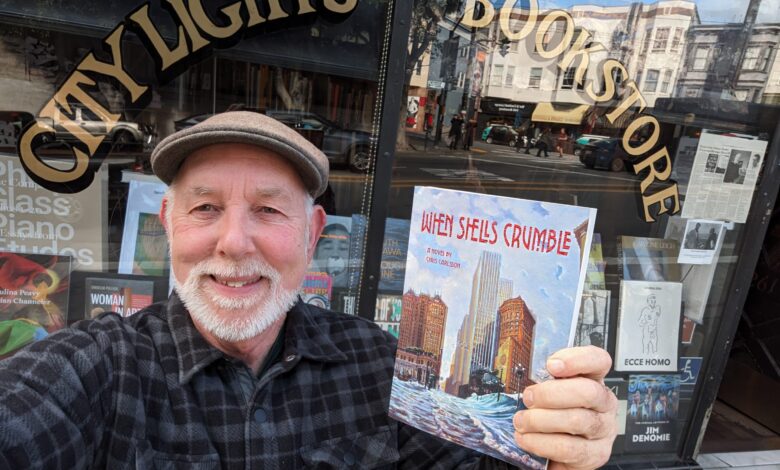Q&A with Chris Carlsson, author of new dystopian sci-fi ‘When Shells Crumble’

While most dystopian novels take readers to a faraway land of oppression and revolution, Mission District historian, activist, and tour guide Chris Carlsson decided to use his own city as the staging ground of his new dystopian fiction, ‘When Shells Crumble.’
The book opens in 2024 with a judicial coup: The U.S. Supreme Court overturns election results in swing states Arizona and Wisconsin, handing the White House over to a Republican president who replaces the Democratic incumbent. Mass protests follow, ending in a declaration of national emergency and three years of punishing martial law. The federal government is further eroded by a barrage of natural disasters, including heat waves, food shortages and flooding.
Carlsson also tells the story of the people surviving the city’s darkest hour through the lens of a Black San Francisco family, the Robertsons, with a 101-year-old matriarch at the head. The youngest son in the family is Frank, a cop at the University of California, San Francisco, who was drafted into the new regime’s Homeland Security strike force in his 60s; an urban farmer granddaughter, Janet, navigates the rapidly changing city.
Carlsson, a longtime Mission resident, is a local historian runs the digital archive FoundSF, a collection of historic photos and articles detailing San Francisco’s forgotten days. He is active in unearthing the city’s past for current residents, leading bike tours pointing out San Francisco’s old waterways and the scars of the 1906 earthquake. He narrowly avoided becoming part of the city’s history himself, fighting off an eviction of his entire building in 2015.
Mission Local sat down with Chris Carlsson for a Q&A on the thinking behind his new book, “When Shells Crumble.”
Mission Local: What motivated you to write this novel?
Chris Carlsson: I think there’s a widespread sense of doom and despair that affects any thinking person. I wanted to address some of our worst nightmares, but to do it in a way that underscores the possibilities of intervention, of people engaging and resisting and changing the course of events. Bad things still happen, but out of the gloomy trajectory, many interesting things develop — among future social movements, among characters that embody some of the basic conditions we probably can recognize in our own lives today. Like most sci-fi, it’s a commentary on what is as much as what might be.
ML: Why did you want to write a sci-fi novel?
CC: When I think of fiction, I generally lean towards speculative fiction. I’m not much of a hard-science guy, though I appreciate it, and am endlessly curious about the human dynamics and social interactions that give rise to science, technology, ways of working and making our world, etc. And we live in a bio-medical capital in San Francisco, so recognizing how much wealth is flowing into research and development around longevity, medical care, aging and all that, combined with the endless tinkering going on out of sight from most of us, by all sorts of tech-savvy folks, it was easy to make those elements key to the story.
ML: In “When Shells Crumble,” there are several subplots. Which one is your favorite? Which one was the first to be born? And what was the process of joining them all together — did it come to you naturally, or was it planned from the start?
CC: Good question. I started out with the Robertson clan. I spent a good long time developing their storylines, along with “Large Larry” Lansing, the big cannabis entrepreneur who strikes it rich before the story starts by helping out a biotech startup with its “Hempattery” idea. But I chopped off the first 14 chapters of the book before publishing, so a lot of that got left on the cutting-room floor. Then, I knew I wanted nature to have a voice, to be an active historical agent in its own right. It took more than a third of the book before that found its vehicle and became a driving part of the story. I was very happy with that thread by the time I was done. It’s difficult to say one or another is my favorite, but I do have a number of favorite scenes that succeeded at what I was trying to get to.
ML: How do you think your personal experience as an activist, and your understanding and engagement with the city of San Francisco as a local historian, tie into how you shape the characters — for example, the Robertson family?
CC: My depth of knowledge about San Francisco, both socially and ecologically, gives me a great foundation from which to develop characters and events. If I didn’t know so much about the city’s history, I think a certain plausibility would be lost, and certainly the geography of the city would be faulty in key ways.
The Robertson family, for whom I provide a family tree on the first pages of the book, are in the middle of everything in the book. Not all of them, but Frank the cop and his niece, Janet, a farmer and organizer, are primary characters. I wanted Frank to be a window into the forces of repression and how there are fissures there, too, especially because of the many people of color employed in those bureaucracies. Janet and her best friend, Vero, are immediately swept up into all sorts of underground and resistance activities and, as the story progresses, we meet a lot of people, organizations, and scenarios that they are in the middle of.
I’ve been an activist of sorts since the late 1970s (rather less active these days, though still very supportive of the ongoing protests against the Gaza genocide, against fossil fuels and the banks that sustain them, against police violence and inequality, etc..) I’ve lived through a lot, from publishing Processed World and distributing it on the streets of the Financial District during the Reagan/Bush years, to the eruption of Critical Mass and bike politics and activism from the early 1990s through its first 20 years, to the 1999 WTO protests in Seattle, to Occupy in 2011, and much in between and after. I try to incorporate a lot of those experiences in my attempts to describe how future social movements might emerge and contest far harsher conditions than we’ve had to face yet.
The Robertson clan, as a Black San Francisco family with roots in the WWII Great Migration (the 100-year-old matriarch is in the story, too), gave me a chance to appreciate the centrality of the black experience in San Francisco going back decades. When I first moved into the city (I had my teen years in Oakland), I got a place at Haight and Cole streets when the upper Haight was 50 percent boarded up and the entire length of Page Street from Golden Gate Park to Market was owned by African-Americans. I felt right at home there, having grown up adjacent to Black America in Oakland and, before that, in Chicago’s South Side. But, as the gentrification engine began grinding through the neighborhood, the demographics quickly changed and, as we know, San Francisco’s Black population has fallen dramatically (from approximately 100,000 in 1970 to about 35,000 now). So I feel that absence and wanted to bring it to the center of my book.
ML: For a dystopian book, why did you choose to let it take place from 2024 to 2027?
CC: As I alluded to above, most people are struggling with all sorts of dark forebodings, worrying about everything from catastrophic climate collapse to a full-blown fascist takeover of the country. It all feels quite imminent. So, instead of shrugging that away, and hoping/pretending that it won’t get that bad, I went for it. Why not just let it all come at us and see how we might respond with compassion and solidarity and empathy to that?
ML: Were there any coincidences in reality as you were writing the book?
CC: Hilariously, as I was writing about a massive atmospheric river bringing weeks of torrential rains and flooding to California, it began to happen! Last winter, as I was rolling towards the climax of the novel, I felt like I’d invoked the storms that hit us as the year turned from 2022 to 2023.
ML: How is “When Shells Crumble” different from your previous novel, “After the Deluge?“
CC: “When Shells Crumble” was going to be the prequel to “After the Deluge,” which I wrote 20 years ago. That novel, “Deluge,” is set in the year 2157, and it portrays San Francisco as a green city utopia, plenty of everything for everyone, no scarcity to speak of, everyone works as much or as little as they like at whatever they feel like doing, there is no money, no markets and no capitalism. I wanted to describe a world that I’d rather live in than this one.
The plot, however, is driven by two young men, one a recent arrival, through whose eyes we see how this different society “works.” The other is a teenager growing up at the edge of Bernal Heights Park, who turns out to have a “thing” for fire, and we follow him as he goes around setting fires. What does utopia do with bad behavior? When there are no cops and no jails? But “Crumble” became its own book, set in the immediate future, and too far removed from the other timeline to really be a prequel. Nevertheless, I managed to include a smattering of details that readers of the first book will recognize as reappearing far in the future.
ML: Do you have any future book ideas?
CC: Oh sure. I always have a few things on the stove. But nothing that will appear right away. There are plans for a revised 2nd edition of “Hidden San Francisco,” which unfortunately was published almost on the day the pandemic really started. So bookstore appearances, media coverage, all that was all canceled, and the book languished in the darkness imposed by Covid-19. I managed to sell several hundred copies directly, but anyway, the publisher and I are excited about an expanded 2nd edition, probably to come out in 2025.
You can buy “When Shells Crumble’”on Chris Carlsson’s website for $25, and at San Francisco bookstores, including City Lights Books, Medicine for Nightmares, Bird and Beckett, Dog-Eared Books, Borderlands, and Bound Together Books.
Source link










